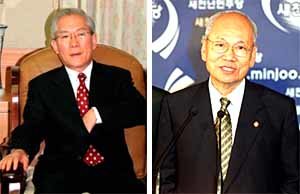Parties differ widely on inter-Korean issues
Parties differ widely on inter-Korean issues
Posted August. 10, 2000 19:48,

The ruling and opposition parties have been embroiled in a new round of partisan strife over inter-Korean problems and Seoul-Washington relations following the political turmoil involving the ruling camp`s unilateral passage of a National Assembly revision bill at the Steering Committee.
The fresh bipartisan dispute was triggered by the opposition Grand National Party (GNP) president Lee Hoi-Chang`s assertion Wednesday that the government was doing nothing to check rising anti-American sentiment and demands for the withdrawal of the U. S. Forces in Korea (USFK). Behind this are the parties` conflicting views on crucial inter-Korean matters in the wake of the mid-June summit between the South and North Korean leaders.
The ruling Millennium Democratic Party (MDP) chairman Suh Young-Hoon held a press conference on August 10 and dismissed the GNP leader`s statement, calling it distorted. He said Lee spoke as if President Kim Dae-Jung had neglected to address the anti-American trend and the demands for USFK withdrawal. Suh noted that Kim had repeatedly stressed at cabinet meetings and on other occasions that there was nothing wrong with voicing opinions on Korea-US relations, but anti-American sentiments benefitted no one.
The MDP chairman demanded that the opposition leader retract his remarks, insisting that they distorted the truth and would have an adverse impact on the Seoul-Washington relationship. Suh also asked Lee to refrain from making such statements in the future.
On the other hand, GNP senior deputy spokesman Chang Kwang-Keun released a statement that claimed the MDP was stricken with a serious disease, and noted that his party president mentioned the people`s skepticism regarding the government`s lukewarm attitude toward the SOFA revision, Nogun-ri massacre and removal of Maehyangri bombing site. It is hard to understand why the ruling party picks quarrels with the GNP, he added.
At the party caucuses, the GNP members unleashed a volley of outcries against the government. They contended that the government was spreading the illusion among the people that unification has almost been achieved, consequently leading to increased demands for a U. S. troop pullout. Others argued that the President is solely concerned with inter-Korean problems, adding that without them, the government could be declared virtually brain-dead.



![[김순덕의 도발] ‘李부터 연임’ 개헌, 이 대통령은 가능성을 말했다](https://dimg.donga.com/c/138/175/90/1/wps/NEWS/IMAGE/2026/01/16/133172656.1.jpg)



